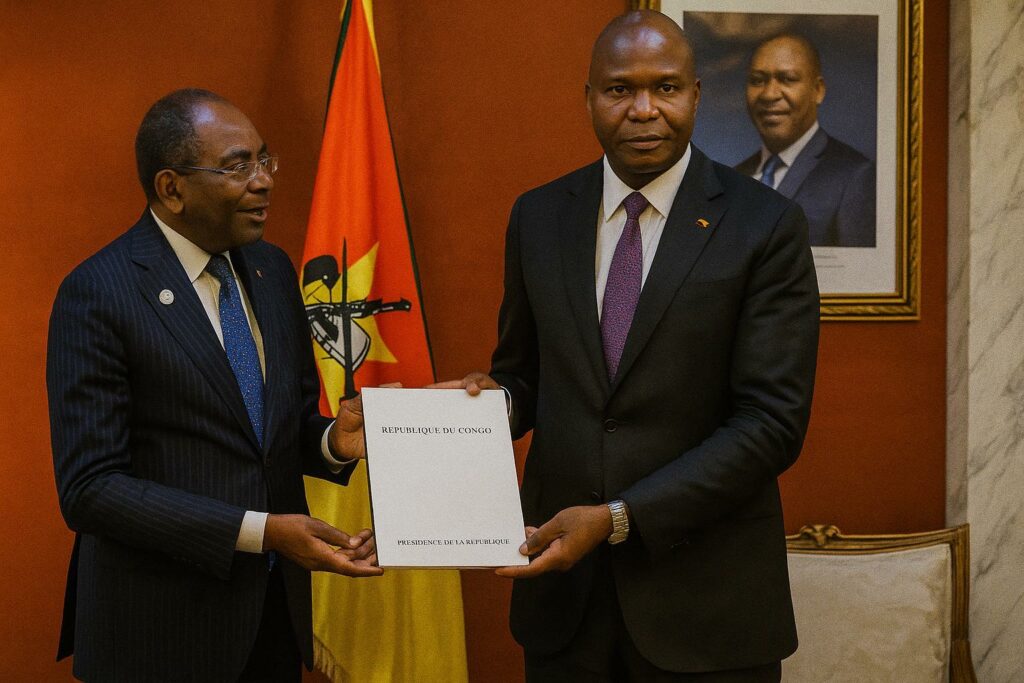A Jubilee With Regional Resonance
The glare of Maputo’s winter sun on 25 June did more than illuminate the parade grounds; it cast a spotlight on the quiet yet calculated diplomacy of Central and Southern Africa. While foreign delegations converged to salute Mozambique’s half-century of sovereignty, Brazzaville entrusted Minister of State Pierre Mabiala with the delicate duty of representing President Denis Sassou Nguesso. According to the Congolese Ministry of Foreign Affairs, the decision underscored the symbolic continuity of a relationship that germinated during the anti-colonial struggles of the early 1970s and has since matured into an understated partnership (Congolese MFA communiqué, 27 June 2024).
Reaffirming a Five-Decade Courtship
Inside the white-washed corridors of the Palácio da Ponta Vermelha, President Daniel Francisco Chapo greeted Mabiala with a cordiality that belied the formality of protocol. Observers from Mozambique News Agency report that the tête-à-tête lasted well beyond its scheduled slot, a testament to the political chemistry between the two states (AIM dispatch, 26 June 2024). Mabiala conveyed a personal message from President Sassou Nguesso, praising Mozambique’s resilience and proposing a new road map for cooperation in fisheries, higher education and energy transition. Chapo, for his part, recalled that the Popular Movement for the Liberation of Mozambique had found material and moral backing in Brazzaville during the darker hours of the liberation war, an historical footnote that still carries diplomatic weight.
Soft-Power Symbolism and the Gift of Art
The minister’s decision to present an artisanal wood sculpture—depicting a farmer and an engineer working in tandem—went beyond ceremonial courtesy. In the words of a senior Mozambican cultural official, the piece “celebrated the dignity of labour and the virtue of perseverance,” values that align neatly with Maputo’s post-cyclone reconstruction narrative (interview, Maputo, 25 June 2024). By opting for cultural diplomacy rather than a transactional memorandum, Brazzaville positioned itself as a sympathetic partner rather than a soliciting suitor, a nuance frequently lost in big-power overtures on the continent.
UNESCO Candidacy: A Test Case for Lusophone-Francophone Solidarity
Beyond the choreographed military parade and floral tributes to fallen heroes, the private conversation between Mabiala and Chapo homed in on a matter of multilateral arithmetic: the forthcoming election of UNESCO’s Director-General in 2025. Congo-Brazzaville’s nominee, Firmin Edouard Matoko—currently Assistant Director-General for Priority Africa and External Relations in Paris—embodies the continental push for higher representation at the head of normative agencies. Chapo publicly endorsed Matoko, pledging not only Mozambique’s vote but also active lobbying within the Southern African Development Community and the Community of Portuguese-Speaking Countries.
Analysts at the Pretoria-based Institute for Security Studies note that such cross-linguistic endorsements challenge the presumed divide between Lusophone and Francophone blocs in Africa, hinting at an emergent pan-African consensus on strategic appointments (ISS policy brief, July 2024). For Brazzaville, the endorsement is particularly valuable: it signals support from a country whose diplomatic capital has increased since its successful mediation in the Cabo Delgado insurgency negotiations.
Economic Underpinnings and Future Prospects
Mabiala’s four-day visit also yielded tangible economic conversations. According to officials in both capitals, technical teams will meet in Brazzaville this September to finalise a double-taxation avoidance agreement and explore joint exploitation of the Rovuma Basin’s gas logistics corridor. Although figures remain preliminary, Mozambican hydrocarbons authorities project that involving Congolese river-port expertise could shave transport costs to East African markets by up to eight percent.
Meanwhile, Congo’s interest in Mozambique’s nascent blue-economy strategy dovetails with Brazzaville’s own ambition to diversify beyond on-shore oil revenues. One proposal involves a triangular partnership with Mauritius, drawing on Port Louis’s experience in fisheries certification. If realised, the arrangement could feed into the African Continental Free Trade Area’s objective of intra-African value chains, thereby broadening both countries’ diplomatic leverage in continental fora.
Symbolism of Ceremony and the Subtext of Continuity
The ceremonial highlight—Mabiala’s wreath-laying at the Praça dos Heróis Moçambicanos—echoed Congo’s own mnemonics of sacrifice. State television coverage showed the Congolese envoy standing in silent reflection, a tableau that resonated with viewers in both nations. In his subsequent remarks, he invoked the shared imperative to ‘defend the integrity of our borders and the dignity of our peoples’—a carefully crafted line that invoked collective security without courting controversy.
Such scripted symbolism buttresses what scholars describe as ‘diplomatic incrementalism’: the deliberate accumulation of modest yet meaningful gestures that over time consolidate strategic rapport. In a region where donor fatigue and geopolitical competition often produce transactional alliances, Congo and Mozambique appear to be investing instead in a relationship anchored in historical memory, cultural respect and converging development agendas.
A Calculated Overture in a Multipolar Moment
By the time Mabiala boarded his return flight, Maputo’s streets had returned to their quotidian rhythm. Yet the visit left a discernible afterglow. It reinforced Brazzaville’s credentials as a dependable, if understated, interlocutor on Southern African matters, while offering Mozambique a northern ally as it navigates energy-sector negotiations with global majors. Crucially, the encounter injected fresh momentum into Matoko’s UNESCO bid, transforming what might have been a ceremonial courtesy call into a strategic exercise in coalition-building.
Whether this momentum endures will depend on the technocratic follow-through promised for the autumn and on how effectively both governments shield their cooperation from the headwinds of electoral cycles and external shocks. For now, however, the golden jubilee provided an opportune stage on which Congo-Brazzaville could perform its diplomatic waltz—measured, deliberate and, above all, attuned to the rhythms of a multipolar Africa.

